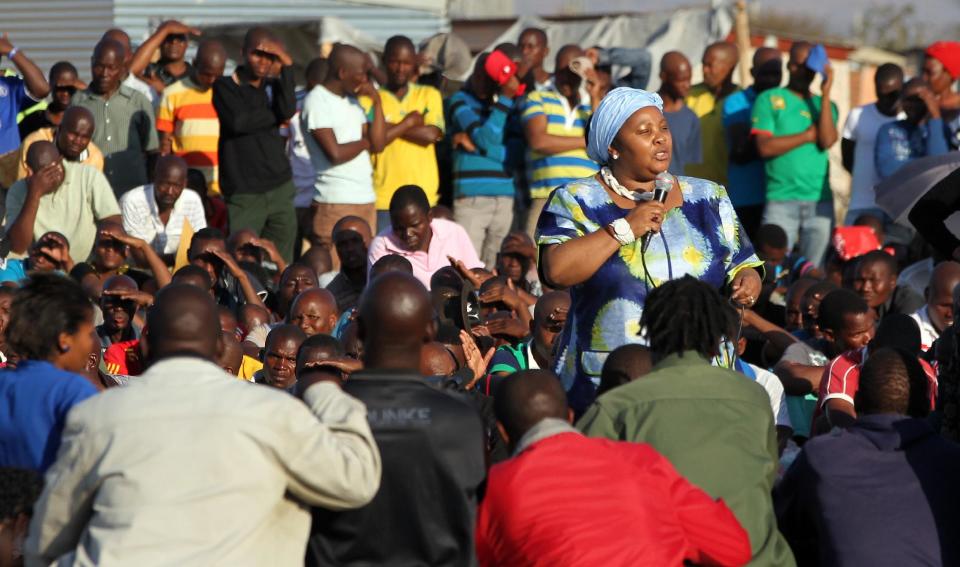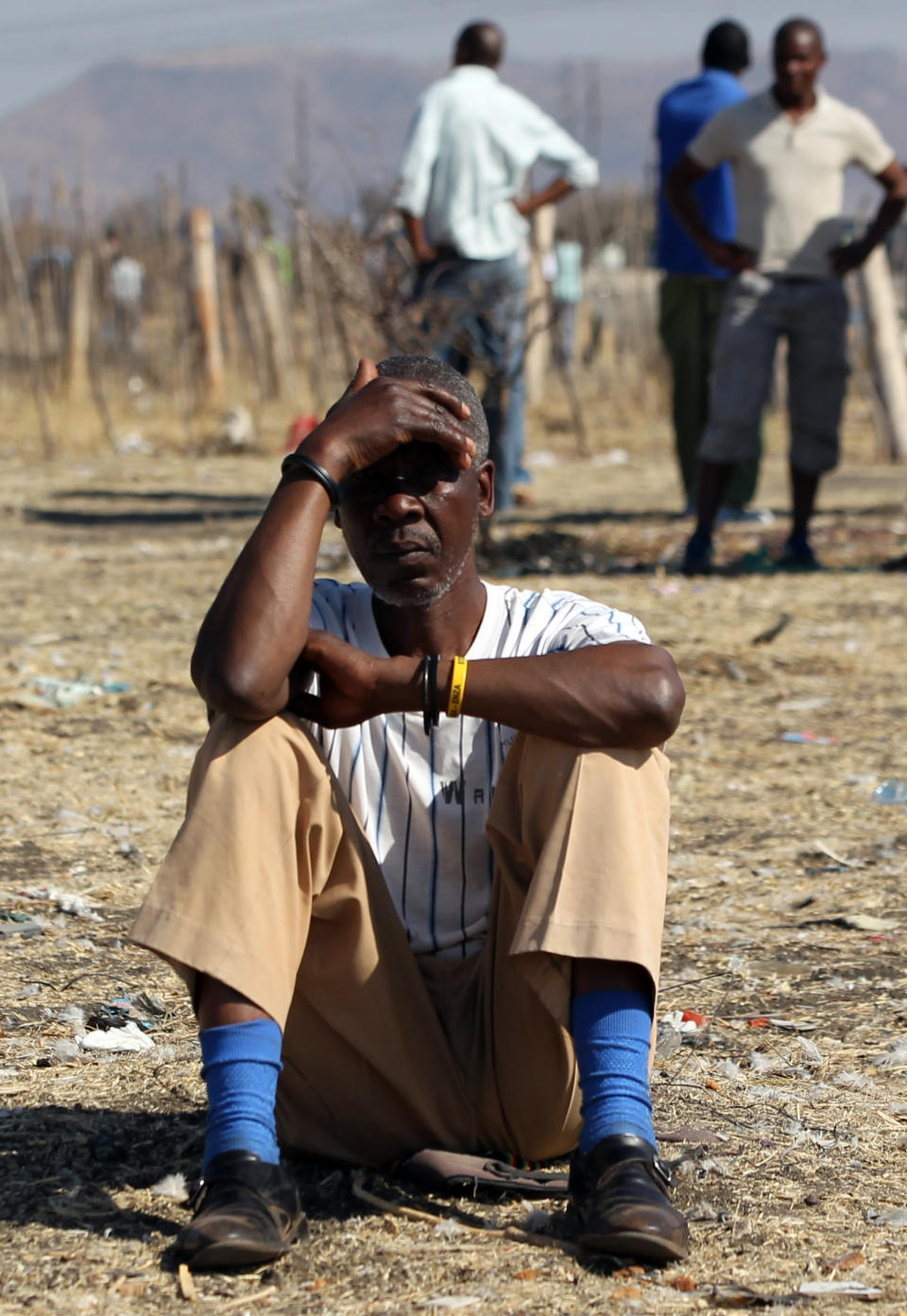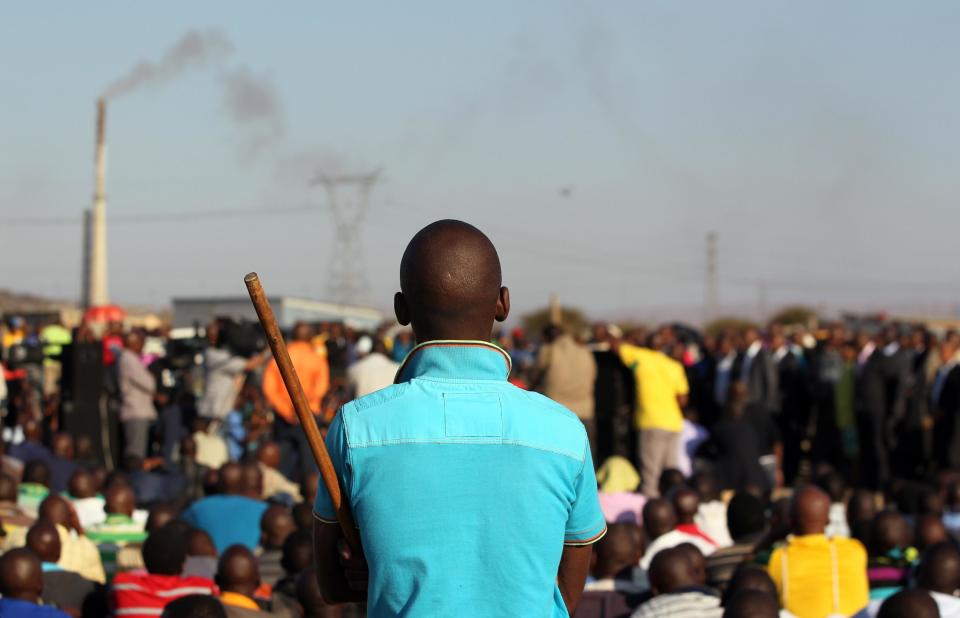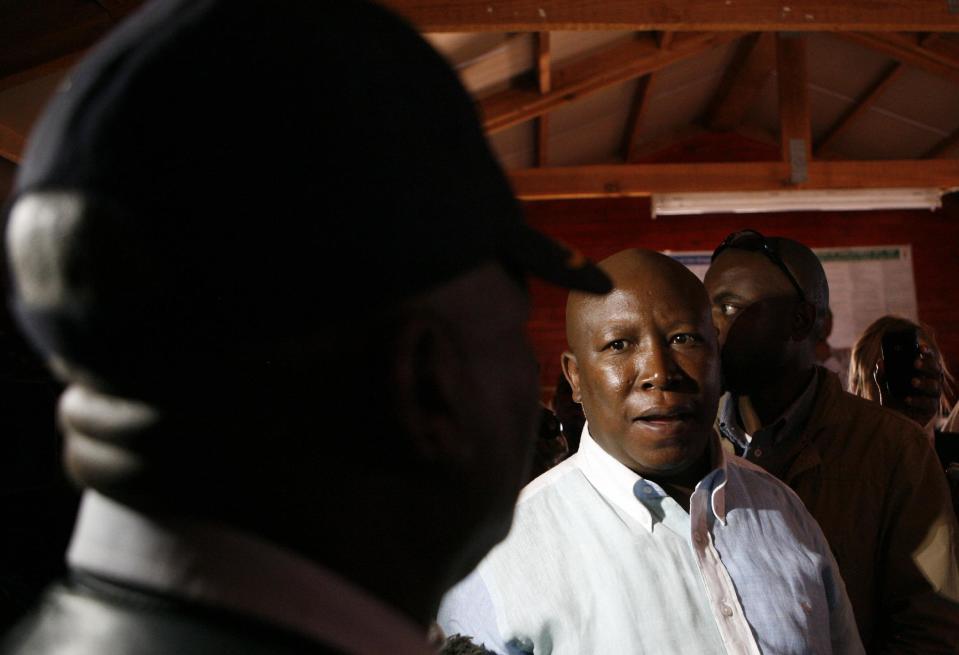Some SAfrican miners felt invincible to bullets
MARIKANA, South Africa (AP) — At the dusty site of the last week's police shootings in South Africa that killed 34 miners and wounded 78, hundreds of mourners walked barefoot Tuesday as church leaders blessed the ground, with a Methodist bishop drawing a large cross in the dirt.
"Church members have come to express solidarity in the wake of what really has been a shocking event," Bishop Gavin Taylor said. "It's almost indescribable that people could have been killed in this way."
As others sang hymns one woman, Alakhe Nombeu, sobbed. She said her brother was one of the strikers killed by police volleys of gunfire last Thursday and that she finally found the name of her missing husband among those arrested on Sunday, three days after the shootings.
Two men who survived the mass shooting by police say a traditional healer told the strikers that police bullets would not harm them if they used traditional medicine, a South African newspaper reported Tuesday as the mining company postponed an ultimatum for workers to return to work.
Firebrand politician Julius Malema and leaders of the striking miners went to a police station near the mine Tuesday to file a criminal case of murder against the police for the shootings.
"We strongly believe that it is within the laws and constitution to hold all people who kill other people accountable within the confines of the law," Malema's spokesman Floyd Shivambu told reporters.
Malema said he does not trust the results of a commission of inquiry being arranged by South African President Jacob Zuma because it would be "manipulated by the politicians."
Malema was expelled from Zuma's governing African National Congress in April and has used the killings outside the platinum mine against Zuma. He told reporters outside the police station that "President Zuma doesn't care about these people."
Minister in the Presidency Collins Chabane announced that officials by late Tuesday had identified 33 of the 34 bodies of shot miners, including one man from Lesotho, a mountain kingdom surrounded by South Africa. Chabane's spokesman Harold Maloka said it had taken days to check the mine's data base, the government data base and ensuring that families were able to identify the men.
"It becomes a long process because some family members were looking for their loved ones and they might not be among the dead at the morgue or the wounded in hospitals," he said.
No striking miners will be fired in the week that South Africa officially mourns the killings, the presidency said on Tuesday.
Managers of Lonmin PLC platinum mine had ordered strikers to report for duty by 7 a.m. Tuesday or get fired, even as some family members still were searching for missing loved ones, not knowing whether they were dead or alive among some 250 arrested protesters or in one of the hospitals.
An inter-ministerial committee led by Chabane convinced managers of Lonmin PLC platinum mine not to act on the dismissal ultimatum during a week of national mourning that began Monday, according to Maloka.
Two survivors of the shootings told the Daily Dispatch that many of the miners drank a brown muti, or traditional medicine, to strengthen them ahead of the confrontation with police.
"They were cut several times on their upper body and a black substance was smeared on the wounds," Nothi Zimanga said, according to the newspaper in East London, in the country's Eastern Cape where many miners come from. "They were then told when they confront the police they must not look back and must just charge forward. If you look back then the muti will not work."
Miner Bulelani Malawana said he was offered the muti for $125 but turned it down, as did Malawana.
Some 3,000 rock drill operators started the strike Aug. 10 demanding higher wages. The operators are among the least educated of mine workers, often illiterate and pride themselves of doing the most dangerous job in the mine.
Legislators held a special memorial service at the Parliament in Cape Town on Tuesday. It was opened by the African National Congress chief whip, Mathole Motshekga, who addressed an apparent growing tendency to resolve disputes with violence in South Africa.
"It must never be in our psychology as a people that to achieve our demands, we must engage in violence and kill," Motshekga said. "It surely must never be part of our being as a people that the maintenance of law and order should have to end in bloodshed."
The mine's executive vice president Mark Munroe told TalkRadio 702 FM early Tuesday that those who did not report for work will be punished, but not necessarily dismissed.
"It won't help if Lonmin goes out and dismisses a whole lot of people for not coming to work today," he said. "It will set us back significantly in terms of violence, in terms of building trust."
Sue Vey, a public relations specialist representing Lonmin, said about 33 percent of workers expected for the morning shift reported for work Tuesday, up only slightly on 30 percent who reported Monday in response to an earlier ultimatum. Another publicist for Lonmin, Gillian Findlay, said that only 19.5 percent of rock drill operators showed up Tuesday.
Lonmin said the mine had resumed operations on Monday.
Vey said workers were mainly involved in sweeping, making areas safe and having briefings. Industry experts say a workforce of at least 80 percent is needed to actually produce platinum.
The mine cannot operate without rock drill operators, who man the massive drills deep underground in the most dangerous job at the mine.
London-registered Lonmin, the world's third-largest platinum producer whose shares have taken a hard knock, already has said that the strike has caused the company to miss its production target for the year of 750,000 ounces.






